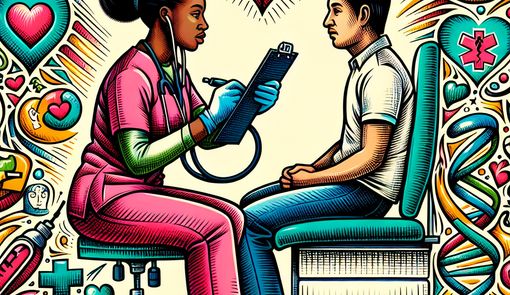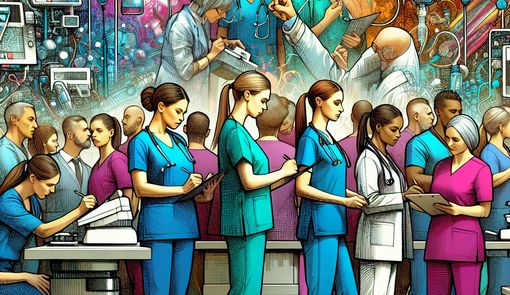Top Skills for Occupational Health Nurses: A Comprehensive Guide

Occupational Health Nurses (OHNs) play a critical role in bridging the gap between health and work, focusing on the promotion and restoration of health, prevention of illness and injury, and protection from work-related and environmental hazards. As vital members of the occupational health and safety team, OHNs must possess a multifaceted skill set to be effective in their role. This comprehensive guide delves into the essential skills for OHNs and provides insights into how these professionals can develop and enhance their abilities to excel in this challenging and rewarding field.
Interpersonal and Communication Skills
One of the core elements of an OHN's role is communication. The ability to communicate effectively with a diverse workforce, management, and other healthcare professionals is paramount. Clear and compassionate dialogue can make a profound impact on employee health outcomes. Furthermore, OHNs must be adept at active listening and empathetic responses to understand and address workers' concerns adequately.
To develop these skills, OHNs should seek continuous education offerings such as communication workshops or even consider pursuing further studies in psychology or counseling. Regular reflection on interactions and seeking feedback from colleagues can also be invaluable.
Clinical Competence
Occupational health nursing is a field that necessitates a firm foundation in clinical skills. Competence in performing assessments, managing injuries and illnesses, and understanding the principles of occupational medicine are critical. OHNs should stay abreast of the latest clinical guidelines and research in occupational health and promote evidence-based practices.
Participation in professional development programs, such as occupational health nursing certification courses, can aid in enhancing clinical skills. Additionally, attending seminars, webinars, and conferences focused on occupational health can keep nurses informed on emerging trends and best practices.
Health and Safety Regulation Knowledge
An intimate understanding of workplace health and safety regulations is essential for OHNs. They must ensure compliance with laws like OSHA standards and be prepared to lead initiatives that foster safer workplace environments. This includes hazard recognition, risk assessment, and the implementation of appropriate controls to mitigate risks.
OHNs can improve their regulatory knowledge by subscribing to industry newsletters, engaging in professional associations, and participating in training sessions that focus on the legal aspects of workplace health and safety.
Case Management Skills
Effective case management involves the coordination of care to ensure comprehensive and cost-effective treatment for work-related injuries and illnesses. OHNs should be skilled in developing and executing return-to-work plans that facilitate an employee's safe and timely return to the workforce.
Engaging with case management courses and certification programs can greatly benefit OHNs looking to refine these skills. Staying connected with multidisciplinary teams and learning from each case's unique challenges are also practical ways to enhance case management expertise.
Health Promotion and Wellness Expertise
Encouraging and facilitating health and wellness programs is another facet of the OHN role. Beyond managing illness, OHNs are instrumental in promoting healthy behaviors and preventive measures to improve the overall health of employees.
To excel in this area, OHNs may undergo training in wellness program planning and execution. This can include certification in wellness coaching or health education.
Leadership and Management Skills
Leadership is paramount for OHNs as they are often responsible for developing and managing occupational health programs. This requires strategic thinking, decision-making abilities, and a vision to advance workplace health initiatives.
The pursuit of additional qualifications, such as a master's degree in nursing or healthcare administration, can be advantageous. Engaging in mentorship opportunities and participating in leadership development programs can also be key to bolstering management capabilities.
Adaptability and Problem-Solving Abilities
The dynamic nature of industrial settings demands that OHNs be highly adaptable and quick problem solvers. They must be able to respond promptly to accidents and emergencies, as well as to the ever-changing landscape of workplace health concerns and regulations.
OHNs can foster these skills through simulation training and emergency preparedness drills. Critical thinking workshops and exercises can also provide practice in quick decision-making and effective problem-solving.
Cultural Sensitivity and Diversity Awareness
With an increasingly diverse workforce, cultural competence is becoming more important in healthcare settings. OHNs must be sensitive to and respectful of cultural differences and how these may impact health behaviors and needs.
Cultural sensitivity training and immersion experiences can be effective ways for OHNs to develop the capacity to interact effectively with individuals from various backgrounds. Joining diversity councils or committees can also expose OHNs to a broader range of perspectives.
Technical Proficiency
Modern occupational health nursing often involves the use of technology for data management, health informatics, and telehealth services. OHNs must be comfortable with electronic health records (EHRs), data analysis tools, and virtual communication platforms.
Continuous learning in health informatics and technology through specialized courses or certifications can keep OHNs at the cutting edge of the field. They can also seek to increase familiarity with new technologies by participating in pilot programs or workshops.
Self-Care and Resilience
Lastly, the demanding nature of occupational health nursing means that self-care and resilience are non-negotiable skills. OHNs must maintain their health and well-being to provide high-quality care for others.
Engaging in regular self-care routines, mindfulness practices, and resilience building activities such as yoga, meditation, or stress management workshops can help OHNs sustain their energy and focus. Peer support groups and professional counseling services are also valuable resources for maintaining mental and emotional health.
In conclusion, the role of an Occupational Health Nurse is multifaceted and requires a wide array of skills. By adopting a mindset of lifelong learning and actively seeking opportunities for personal and professional development, OHNs can continuously improve their competency and effectiveness in their vital role within the workforce.
Frequently Asked Questions
1. What are the primary responsibilities of Occupational Health Nurses (OHNs)?
Occupational Health Nurses are responsible for promoting and protecting the health of workers in various industries. Their duties include assessing workplace health hazards, providing first aid, conducting health screenings, managing workers' compensation claims, and promoting employee wellness programs.
2. How can OHNs enhance their communication skills?
OHNs can improve their communication skills by actively listening to employee concerns, participating in communication workshops, seeking feedback from colleagues, and considering further studies in psychology or counseling.
3. What qualifications are required to become an Occupational Health Nurse?
To become an OHN, individuals typically need a nursing degree, preferably with a focus on occupational health or a related field. Certification in occupational health nursing may also be required or preferred by employers.
4. How can OHNs stay updated on the latest occupational health trends and regulations?
To stay informed on industry trends and regulations, OHNs can subscribe to occupational health newsletters, attend seminars and conferences, participate in professional associations, and enroll in continuing education courses.
5. What is the role of technology in modern occupational health nursing?
Technology plays a significant role in occupational health nursing, enabling OHNs to manage data efficiently, utilize health informatics for decision-making, and provide telehealth services. OHNs can enhance their technical proficiency through specialized courses and certifications in health informatics.
6. How important is self-care for Occupational Health Nurses?
Self-care and resilience are essential for OHNs to maintain their well-being and provide quality care to others. Engaging in self-care routines, mindfulness practices, and seeking professional support are crucial for sustaining energy and focus in this demanding profession.
Further Resources
For readers interested in delving deeper into occupational health nursing and expanding their skill set, the following resources provide valuable insights and opportunities for professional growth:
- American Association of Occupational Health Nurses (AAOHN)
- Website: AAOHN
- A professional organization offering networking opportunities, educational resources, and certifications specific to occupational health nursing.
- Occupational Safety and Health Administration (OSHA)
- Website: OSHA
- Access OSHA's guidelines, regulations, and training materials to stay updated on workplace health and safety standards.
- American Nurses Association (ANA)
- Website: ANA
- Explore resources related to nursing practice, education, and advocacy to enhance overall nursing skills.
- National Institute for Occupational Safety and Health (NIOSH)
- Website: NIOSH
- Discover research, training, and resources related to occupational safety and health from a federal agency.
- Occupational Health & Safety Magazine
- Website: OH&S Magazine
- Stay informed on industry news, trends, and best practices in workplace health and safety.
- Certified Occupational Health Nurse (COHN) Certification
- Website: COHN Certification
- Consider pursuing certification to validate your expertise in occupational health nursing and enhance your professional credibility.
- Society for Occupational Health Psychology (SOHP)
- Website: SOHP
- Engage with a community of professionals focusing on the intersection of occupational health and psychology for holistic workplace well-being.
- Continuing Education Courses
- Explore online platforms such as Coursera or LinkedIn Learning for courses on communication skills, leadership development, and occupational health topics.
These resources offer a wealth of knowledge and support for occupational health nurses seeking to expand their expertise and excel in their careers.






